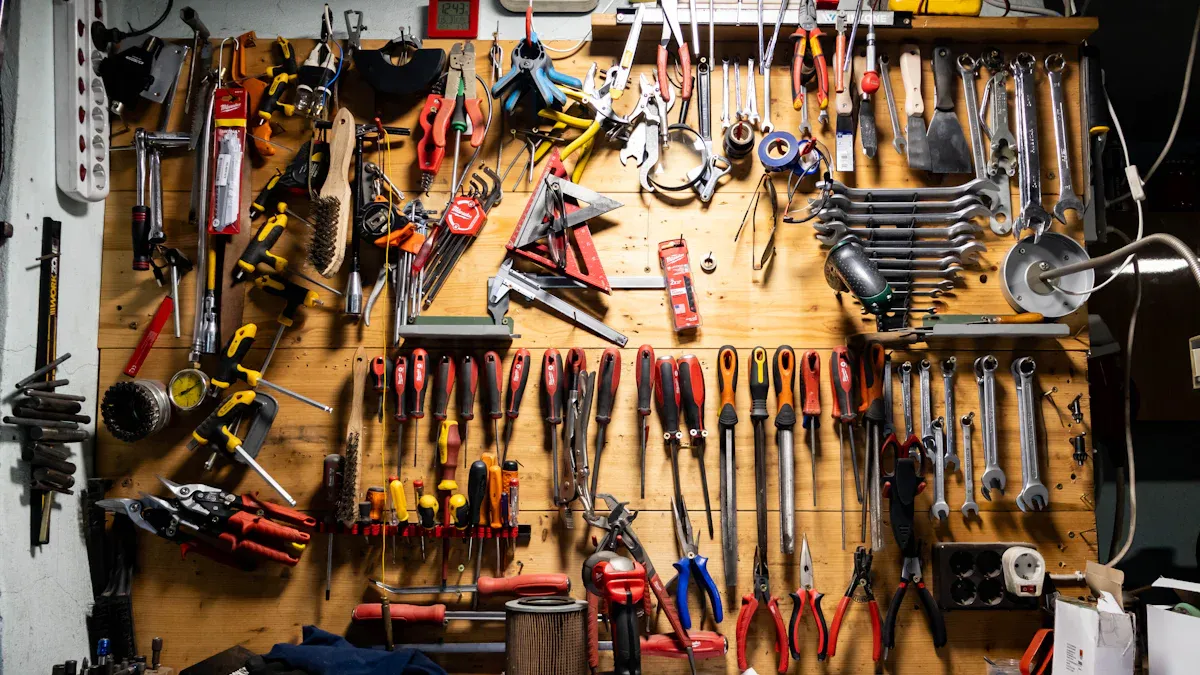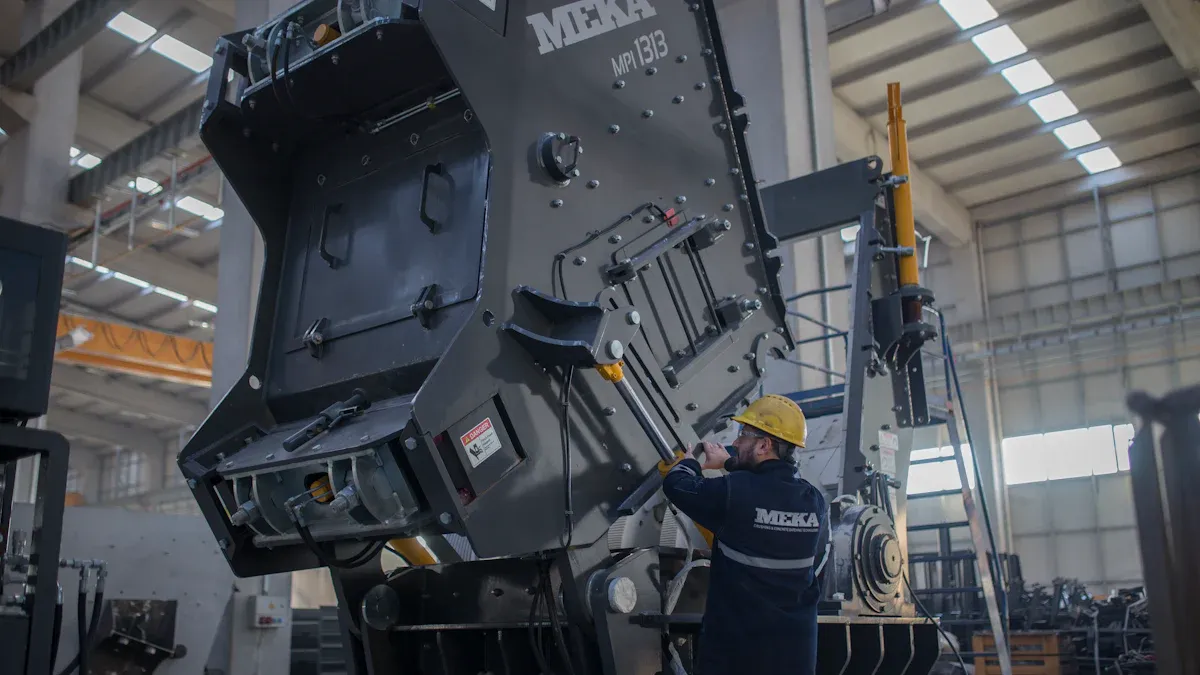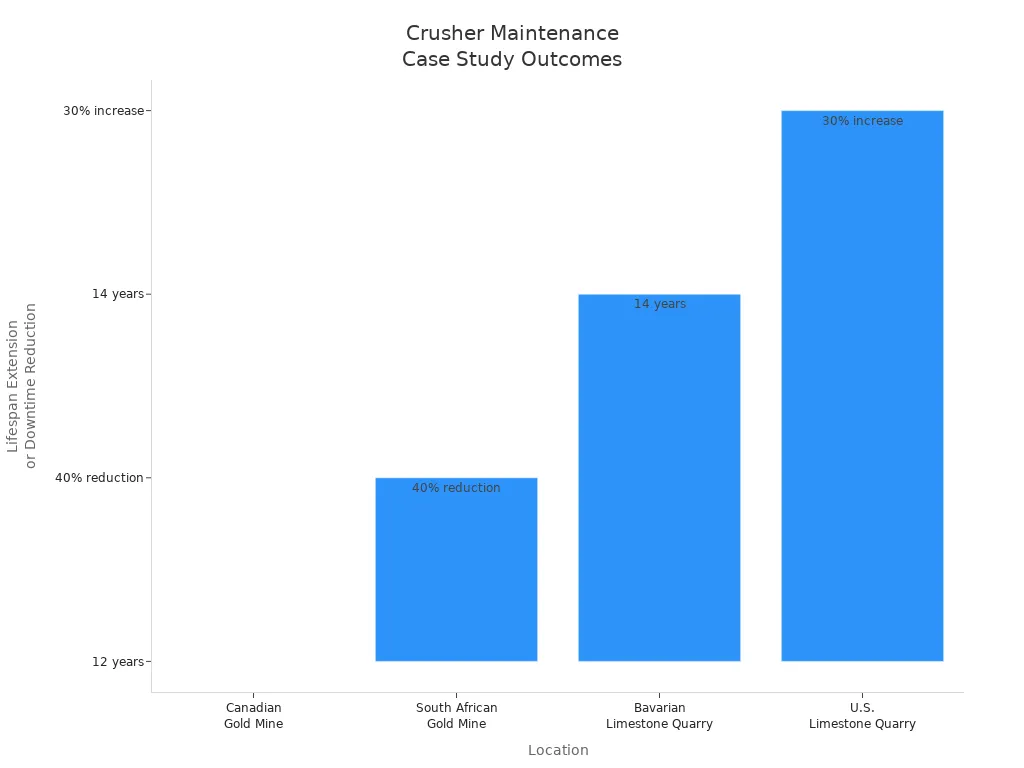
Proper maintenance of crusher parts, including essential components like the eccentric bushing, is crucial for smooth operations in any crushing facility. Neglecting this maintenance can lead to severe consequences. For instance, companies often face significant financial losses, with unplanned downtime costing up to $260,000 per hour. Common mistakes, such as improper lubrication or ignoring manufacturer guidelines for crusher replacement parts, can lead to costly repairs and operational delays, particularly with rock crusher parts.
Key Takeaways
- Regular inspections of crusher parts are essential. Schedule daily, weekly, and monthly checks to catch issues early and prevent costly repairs.
- Follow proper lubrication practices. Adhere to manufacturer recommendations to avoid bearing failures and extend the lifespan of equipment.
- Prioritize operator training. Well-trained operators enhance safety and efficiency, reducing the risk of accidents and equipment damage.
Neglecting Regular Inspections of Crusher Parts

Regular inspections of crusher parts are vital for maintaining optimal performance. Skipping these checks can lead to serious issues down the line. Industry standards suggest a structured inspection schedule to catch problems early. Here’s a quick look at the recommended inspection frequency:
| Inspection Frequency | Description |
|---|---|
| Daily | Conduct a strict checklist to catch early signs of wear on Jaw Crusher Parts. |
| Weekly | Perform detailed inspections for worn belts, loose fasteners, and abnormal vibrations. |
| Monthly | Focus on tasks that extend the life of Jaw Crusher Parts, such as checking bearing temperatures and shaft alignment. |
During these inspections, operators often find common issues. These include:
- Daily inspections for wear and tear.
- Checking belt alignment.
- Lubricating moving parts.
- Managing dust levels to prevent overheating and increased wear.
By scheduling regular inspections, teams can identify wear and tear early. This proactive approach helps prevent costly repairs. For example, maintenance records show that neglecting inspections can lead to premature bearing failures or even ruptured grease lines.
To ensure thorough inspections, follow this checklist:
- Pre-Start Checks: Inspect components for wear, verify guards are functional, check lubrication levels.
- Startup Procedure: Follow startup procedures, allow warm-up, monitor for abnormal vibrations.
- Operating Parameters: Set parameters according to specifications, monitor performance.
- Material Feed: Ensure even feeding, avoid overloading.
- Crushing Chamber: Inspect for blockages, clear obstructions.
- Wear Parts: Monitor and replace worn components.
- Safety Procedures: Adhere to safety protocols, train personnel.
- Shutdown Procedure: Follow shutdown procedures, allow cooling before maintenance.
- Maintenance and Inspection: Conduct regular inspections, keep maintenance records.
Regular inspections not only help in identifying potential issues but also significantly reduce unplanned downtime. A study emphasizes that optimizing inspection intervals can prevent failures and enhance operational efficiency.
Improper Lubrication Practices for Crusher Parts

Proper lubrication is essential for the longevity of crusher parts. It reduces friction and wear on moving components, which helps extend their lifespan. However, many operators make mistakes in this area. They might overlook the manufacturer’s recommendations for lubrication intervals and types of lubricants. This oversight can lead to serious problems.
For instance, improper lubrication is responsible for 70 to 80% of bearing failures in industrial settings. Under-lubrication can cause metal-on-metal contact, leading to overheating and premature wear. On the other hand, over-lubrication can create excess grease that churns inside housings, increasing energy loss and temperature spikes. Both scenarios can result in costly repairs and unplanned downtime.
To avoid these issues, operators should follow a clear lubrication schedule. Here’s a quick look at common lubrication intervals for different crusher parts:
| Crusher Part | Lubrication Interval | Notes |
|---|---|---|
| Bearings | Every 1-3 years | Regular lubrication and inspection needed. Exposure to harsh conditions can reduce lifespan. |
Using the correct type of oil is also crucial. Manufacturers often recommend synthetic oils due to their superior performance in extreme temperatures. Regular checks on oil levels, filters, and contamination are necessary to ensure optimal performance. By adhering to these guidelines, operators can significantly impact the equipment’s longevity and efficiency.
Inadequate Training for Operators of Crusher Parts
Inadequate training for operators can lead to serious issues when maintaining crusher parts. When operators lack the necessary skills, they may struggle with basic tasks, which can result in accidents or equipment damage. Proper training is essential for creating a safe work environment and ensuring efficient operations.
Operators should participate in training programs that cover various aspects of crusher operation and maintenance. For example, Crusher Operator Training provides on-site instruction from product specialists. This training includes operation, troubleshooting, and parts ordering. Additionally, Basic Visual Inspection training helps operators identify operational issues, optimizing machine performance.
Another excellent option is H-E Parts Training, which offers tailored programs that cover:
- Product selection, operation, and maintenance
- Crusher liner selection and optimization
- Spare parts knowledge
- Safety procedures and risk assessment
- Operating and productivity tips
Ongoing training is crucial for enhancing safety and productivity. It reduces the risk of accidents by teaching operators about safety precautions and hazard identification. Certification validates an operator’s competence, boosting employer confidence and operator commitment to safety.
Moreover, well-trained operators improve operational efficiency. They stay updated on technological advancements, which leads to better equipment productivity. Investing in operator training not only increases productivity but also extends the lifespan of the equipment. Regular refresher courses help maintain compliance with best practices and keep skills sharp.
By prioritizing training, companies can ensure their operators are equipped to handle the challenges of maintaining crusher parts effectively.
Ignoring Manufacturer Guidelines for Crusher Parts
Ignoring manufacturer guidelines can lead to significant problems in maintaining crusher parts. These guidelines exist for a reason—they help ensure the equipment operates efficiently and safely. When operators overlook these recommendations, they risk damaging the machinery and facing costly repairs.
Here are some critical manufacturer guidelines that operators often neglect:
- Monitoring systems are essential for early detection of wear on components.
- Proper lubrication is crucial to prevent overheating and excessive wear.
- Routine inspections help identify potential issues before they escalate.
- Operator training in preventative maintenance is vital for efficient operation.
Failing to follow these guidelines can also affect warranty coverage. Adhering to model-specific recommendations preserves warranty coverage and ensures optimal performance across your entire fleet. To maintain warranty validity, customers must:
| Requirement | Description |
|---|---|
| Perform regular maintenance | Follow the schedule outlined in the Operator’s Handbook. |
| Use genuine parts | Only use genuine Tigerbite parts or parts approved by Tigerbite. |
Using genuine parts not only helps maintain warranty coverage but also prevents costly repairs that insurance may not cover. Many failures stem from negligence of manufacturer recommendations, improper setup, and maintenance neglect. Operators must adapt to new equipment requirements to avoid damage and ensure longevity.
By following manufacturer guidelines, operators can enhance the reliability of their crusher parts and avoid unnecessary expenses.
Delaying Repairs on Crusher Parts
Delaying repairs on crusher parts can lead to significant issues. When operators postpone necessary maintenance, they often face escalating costs and equipment failures. Industry data shows that deferred maintenance can cost 3 to 10 times more than regular upkeep. This increase in repair costs can strain budgets and disrupt operations.
Recognizing the signs that indicate immediate repairs are needed is crucial. Here are some common indicators:
| Sign of Repair Needed | Description |
|---|---|
| Unusual Sounds and Vibrations | Abnormal noise or vibration indicates potential issues like loose bearings or internal misalignment. |
| Decline in Crushing Efficiency | Reduced throughput and poor product quality signal maintenance needs due to worn parts or blockages. |
| Excessive Heat and Overheating | Overheating can lead to lubrication failure and damage, often caused by inadequate lubrication. |
| Increased Power Consumption | A surge in power usage may indicate wear or mechanical inefficiencies within the machine. |
| Leakage of Lubricants and Fluids | Fluid leaks can lead to friction and mechanical damage, requiring immediate attention. |
To prevent these problems, operators should follow a structured maintenance schedule. Regular inspections help identify issues before they escalate. Daily checks ensure immediate problems are addressed, while scheduled servicing prevents major breakdowns. Keeping commonly needed parts on hand can also help manage potential risks.
By prioritizing timely repairs, companies can enhance the reliability of their crusher parts and avoid unnecessary expenses. Remember, addressing minor issues promptly can save time and money in the long run.
Avoiding common mistakes in crusher parts maintenance is crucial for operational success. Key pitfalls include:
- Neglecting regular inspections
- Improper lubrication practices
- Delaying repairs
Proactive maintenance not only enhances equipment longevity but also boosts efficiency and safety. Implementing best practices, like regular training and scheduled checks, can lead to significant cost savings and improved performance. Remember, a little effort today can save you a lot tomorrow!

FAQ
What are the signs that crusher parts need maintenance?
Look for unusual sounds, vibrations, overheating, or decreased efficiency. These signs indicate that maintenance is necessary to prevent further damage.
How often should I inspect my crusher parts?
Inspect daily for wear, weekly for detailed checks, and monthly for comprehensive evaluations. Regular inspections help catch issues early.
Why is operator training important for crusher maintenance?
Well-trained operators enhance safety, improve efficiency, and reduce equipment damage. Training ensures they understand proper maintenance practices and equipment operation.
Post time: Sep-03-2025